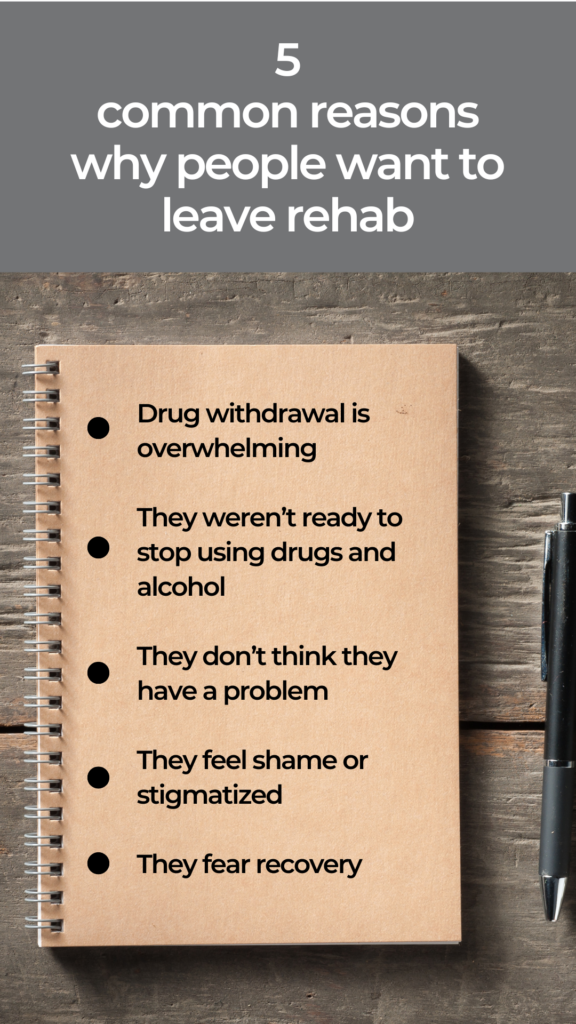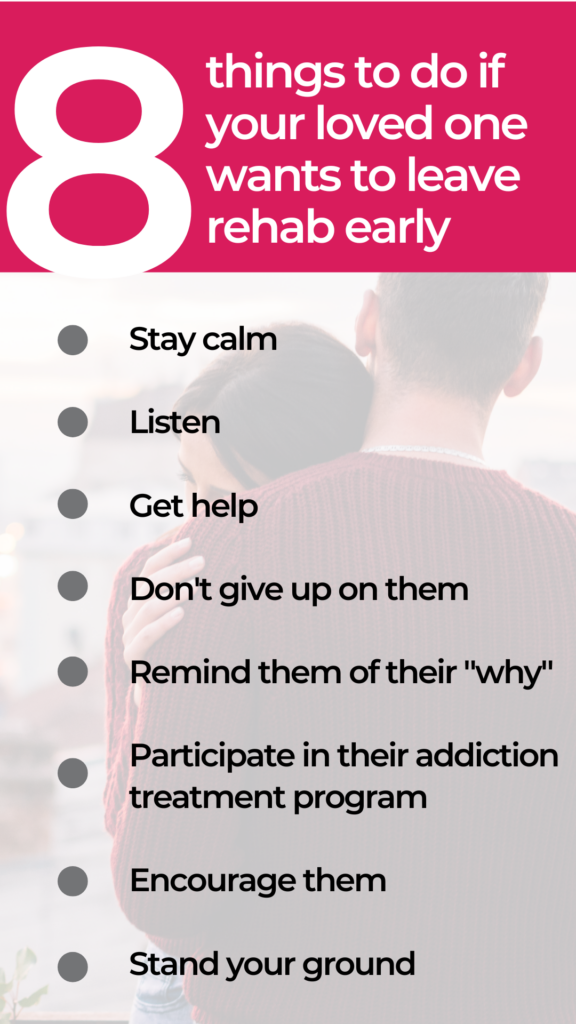It’s not uncommon for someone in residential treatment for a drug or alcohol addiction to want out. But what can you do when a loved one wants to leave drug rehab early? While you ultimately can’t force someone 18 or over to stay in a treatment facility, there are things you can say and do that could help them finish the program they started.
How to Keep Someone in Drug Rehab
Keeping someone from leaving an addiction treatment program before they’ve completed treatment requires an understanding of why they want to leave and what they’re experiencing. Encouraging them to finish treatment is a great start. Explaining that treatment is what’s best for them and your family is an even better approach. Leaving treatment too soon can expose them to health and social risks like a fatal drug overdose, losing their job or going to jail.
It’s important to know what to do if you’re in this situation. People who suffer from the effects of long-term substance use need our support, understanding and sympathy. What they don’t need is someone to enable their disorder by agreeing to pull them out of treatment before they’ve developed the skills, self-awareness and techniques to maintain long-term recovery.
This article explores common reasons why people leave treatment centers early, then provides eight tips to help a loved one complete treatment.
5 common reasons why people want to leave rehab
People usually leave rehab because:
- Drug withdrawal is overwhelming
- They weren’t ready to stop using
- They don’t think they have a problem
- They feel shame or stigmatized
- They fear recovery
@landmarkrecovery Definitely one of the hard parts of recovery😅 #feelthefeels #sittingwithyouremotions #nomoreoblivion #feelthefeelz #soberalert #itwouldbefuntheysaid
As we can see, it’s normal for people to feel conflicted about treatment. A common theme with reasons why people leave treatment early seemingly has to do with fear of the unknown in recovery. They might think they won’t have the support they need inside the facility if they’re separated from family and friends. Depending on how long they’ve been misusing substances, they could also have a hard time imagining a life of sobriety.
“Recovery also means leaving the familiar illness and ‘life as you know it now’ behind, venturing into the world of wellness that is uncertain and unfamiliar to you,” wrote Dr. Susan J. Noonan, a Certified Peer Specialist, in a Psychology Today article.
Experts like Noonan say it’s important to help your loved one prepare for rehab. One way to do this is to make sure they’re committed to getting better. Another way is to make sure they know what to expect before they arrive so there are no surprises.
“All that information should be given upfront,” said John Lieberman, administrative director for Visions Adolescent Treatment Centers, a mental health care provider serving teenagers in southern California. “The kids should know how long treatment’s gonna’ last, what the expectation is early in the process and that their parents are going to be involved throughout.”
8 healthy ways to respond to a loved one who wants to leave rehab early
Whether they call you on the phone or tell you in person, here are eight things to do if your loved one wants to leave rehab early.
Stay calm
Most people experience a wide range of thoughts and emotions during rehab. You could be on the receiving end of those emotions if they call and tell you they want to leave treatment. Especially during the first week of treatment, also known as detox, which is normally when drug withdrawal symptoms are the worst.
Don’t match your loved one’s energy. Stay calm and remind them that the best is yet to come.
Listen
Most rehab patients didn’t want to come to treatment in the first place. Some might’ve been court-ordered. Keeping this in mind, make sure your loved one feels heard, understood and respected. Ask questions. They could be lonely or tired. If so, teach them the HALT Method.
Get help
During rehab, your loved one is surrounded by qualified treatment professionals who are there to help manage their symptoms. They’re not alone and neither are you. Most treatment centers like Landmark Recovery come with a team of therapists, nurses and doctors who can help you keep your loved one in rehab.
Call the facility if you don’t know how to handle the situation. Most treatment centers have procedures they follow when patients want to leave early. Your loved one’s therapist or case manager might even reach out to you first for support.
Don’t give up on them
You might be frustrated with your loved one and begin to feel like all hope is lost. Maybe they’ve tried addiction treatment more than once and relapsed. Perhaps they stole from you or hurt you while they were under the influence. Addiction is a mind-altering disease that can cause people to do things they wouldn’t normally do. It’s also common for people to relapse multiple times in recovery.
Forgive their faults and remain hopeful of the person they could be if they finish treatment and learn healthy life skills.
View this post on Instagram
Remind them of their “why”
Even if your loved one wasn’t 100% ready to stop using drugs, they went to treatment for a reason. They had a “why.” Ask them what it was. Then, help them remember their why if they try to leave early.
Did they want a healthier life? Did they want a better connection with you? Want to take it one step further? Give your loved one something to remember their why that helps them focus on finishing treatment strong. Four examples would be:
- A family picture
- A stuffed animal
- A drawing from their child
- A list of long-term goals
Participate in their recovery program
Most people who struggle with the idea of drug rehab could be experiencing a range of emotions that were subdued by drugs and alcohol. Seeing your face during family therapy sessions or visitation could boost their encouragement levels and motivate them to complete the program.
Encourage them
Your loved one could be worried that they won’t be able to recover. They may feel like going through treatment is too hard. Tell them that they can finish treatment, and when they do, they will have your support. Tell them you believe in them. Continue to remind them that you’ll be there throughout their recovery journey, which starts with them finishing drug rehab.
Stand your ground
If your loved one is used to people enabling their behavior, this is your chance to establish and practice setting boundaries. Let them know what consequences they’ll face if they leave treatment early. Maybe you won’t let them live with you anymore or won’t allow them to see their children until they get clean.
Be firm about your boundaries, but continue to support their recovery.
Need more support?
For more resources and information on how to help someone overcome drug and alcohol addiction, call 888-448-0302 to speak to a recovery specialist. The admissions team at Landmark Recovery is available 24/7 to answer questions on a confidential phone line. They can help guide you through the process to break free from drugs and alcohol.
If you’d rather meet in person, click here to find a treatment center near you.

Choose Recovery Over Addiction
We're here 24/7 to help you get the care you need to live life on your terms, without drugs or alcohol. Talk to our recovery specialists today and learn about our integrated treatment programs.






